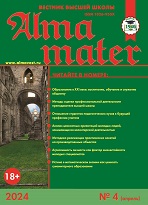UDC 94(470+571)+329
https://doi.org/10.20339/AM.05-22.096
Maxim S. Kozyrev, PhD (Philosophy), Associate Professor at Academy of Management of the Ministry of Internal Affairs of Russia, Moscow; ORCID ID: 0000-0002-1643-3391; Researcher ID: 57188625469. e-mail: max-han@yandex.ru
The purpose of the article is to identify the features of the social position of groups represented by political parties by analyzing their views on the historical past of Russia. The methodology of the work is based on the position formulated by K. Mannheim, according to which ideology is not only a cover or justification by certain social groups for their momentary interests (private ideology), but also a reflection of the social position that they occupy, i.e. a certain social position corresponds to certain points of view and a type of thinking (total ideology). Based on the results of the analysis carried out in the work, the following conclusions were drawn. The attitude towards history on the part of the parties is conditioned by the social position of its representatives. Thus, the ideologists of ‘United Russia’, with the help of an appeal to history, substantiate the naturalness and inviolability of the established order, as well as ideologically amortize deep social differentiation. In turn, the parties of the legal opposition (CPRF and LDPR), in the course of interpreting history, focus on the struggle of elite groups and the positive aspects of competition. The absence of significant historical periods in the ‘Yabloko’ party, with which it would claim to be associated, speaks of the modesty of the party’s social and political base. In general, the political parties of Russia demonstrate, to one degree or another, successful adaptation to the prevailing socio-political conditions, which they are not going to change.
Key words: History, public policy, ideology, political parties in Russia.
References
1. Main. Main publications of Grigory Yavlinsky in 2017–2018. Moscow: RODP “Yabloko”, 2018. 176 p. URL: https://www.yabloko.ru/files/GLAVNOE_2018_web.pdf (accessed on: 18.03.2022).
2. Zhirinovsky, V.V. Vengeance for Russia! Moscow: Publication of Liberal Democratic Party of Russia, 2000. 176 p.
3. Zhirinovsky, V.V., Sidorov, M.N. Politics and Economics for Russia. Moscow: Liberal Democratic Party of Russia Publishing House, 2007. 160 p.
4. Zyuganov, G.A. Ideology of traitors. Bereginia. 777. Owl: Society. Politics. Economy. 2016. No. 2 (29). P. 132–140.
5. Zyuganov, G.A. Communists – 21. Moscow: Algorithm, 2012. URL: http://www.e-reading.mobi/bookreader.php/1020146/Zyuganov_-_Kommunisty_-... (accessed on: 18.03.2022).
6. Historical Knowledge as a Factor of Development. G.M. Mikhaleva, V.L. Sheinis (eds.). Moscow RODP “Yabloko”, 2014. 160 p. URL: https://www.yabloko.ru/files/iz-book-pdf_0.pdf (accessed on: 18.03.2022).
7. Kogan-Yasny, V.V. Private Opinion on Russia — In the Difficult Search for Meaning. Moscow: RODP “Yabloko”, 2016. 100 p. URL: https://www.yabloko.ru/files/kogan_mnenie_2016_web.pdf (accessed on: 18.03.2022).
8. Kozyrev, M.S. Social environment of the modern Russian ruling elite (based on the materials of the publications of the representatives of the political party “United Russia”). Vestnik of Perm University. Ser.: Philosophy. Psychology. Sociology. 2017. No. 4. P. 622–631.
9. Kozyrev, M.S. Social Situation of the “Leftist” Counter-Elite in the Russian Federation (on the Material of Publications of the CPRF Representatives). Social Policy and Sociology. 2019. V. 18. No. 1 (130). P. 157–166.
10. LDPR. Freaks. Moscow: Editions of the Liberal Democratic Party of Russia, 2011. 160 p.
11. Liberal Values and the Conservative Trend in European Politics and Society. Moscow: RODP “Yabloko”, 2015. 232 p. URL:https://www.yabloko.ru/files/alde_prew.pdf (accessed on: 18.03.2022).
12. Mannheim, K. Ideology and Utopia. Moscow: INION, 1992. 245 p.
13. Medvedev, D.A. Russia, forward! URL: http://kremlin.ru/events/president/news/5413 (accessed on: 18.03.2022).
14. On the European path of Russia. G.M. Mikhaleva (ed.). Moscow: RODP “Yabloko”, 2014. 56 p. URL: https://www.yabloko.ru/files/book_yavl_alternative_web_0.pdf (accessed on: 18.03.2022).
15. Message of the President of the Russian Federation to the Federal Assembly of 23.02.1996. URL: http://www.consultant.ru/cons/cgi/online.cgi?req=doc&base=EXP&n=212270&r... (accessed on: 18.03.2022).
16. Putin, V.V. Being Strong: Guarantees of National Security for Russia. Rossiiskaia Gazeta. 20.02.2012. URL: http://www.rg.ru/2012/02/20/putin-armiya.html (accessed on: 18.03.2022).
17. Putin, V.V. Russia Focuses - Challenges We Must Answer. Izvestia. 16.01.2012. URL: http://izvestia.ru/news/511884#top (accessed on: 18.03.2022);
18. Surkov, V.Y. Main tendencies and prospects for the development of modern Russia. Polit.ru. 23.01.2007. URL: http://polit.ru/article/2007/01/23/surkov (accessed on: 18.03.2022).
19. Surkov, V.Y. Sovereignty is a political synonym for competitiveness. Rosbalt. 09.03.2006. URL: https://www.rosbalt.ru/main/2006/03/09/246302.html (accessed on: 18.03.2022).
20. Yarovaya, I. We need the ideology of uniting for success. URL: http://er.ru/news/80068 (accessed on: 18.03.2022).











.png)






